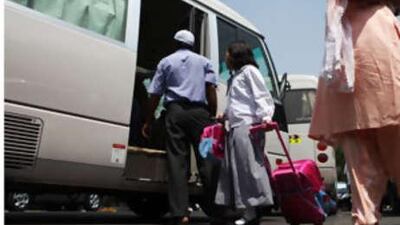ABU DHABI // More children will be using school buses if a new government plan comes to fruition, which should mean less congestion around the capital. The Department of Transport in Abu Dhabi has suggested reforms to the pattern of travel for students to and from school. They hope changes to the school bus system will mean fewer parents will opt to drive their children in a private car. "The traffic congestion on our roads has dire consequences on our well-being and the environment; we believe that the new school travel reforms initiative in coordination with Abu Dhabi Education Council will yield significant benefits for ourselves, our local economy and the environment at large," said Hashim al Hashimi, the public transport director. The use of school buses has become less popular in recent years, following the deaths of two children left alone in their school buses. Aatish Shabin, three, died after being locked in a school bus for several hours in May 2008. A year later Aimann Zeeshanuddin, four, suffered heat stoke and dehydration after being left alone in the mini-bus which brought her to and from school. The new reforms are still being planned and the department hopes to be able to address the problems that parents have about using school buses. These can range from concerns about safety to worries about having special spaces set aside for bags and school books. As well as parents and schools, the DoT will consult with Abu Dhabi Police, Abu Dhabi Education Council (Adec) and the Urban Planning Council. "We will strive to address all these issues in the new reforms to ensure that we have a safe, viable, and environmentally sustainable way of school transport," Mr al Hashimi said. Last September Dubai introduced strict new regulations concerning their school buses, to be enforced by fines paid for by the schools. The buses must be yellow, have a speed limit of 80kph and an air conditioning system set to 21 degrees. In October, the Ministry of Education earmarked Dh 230 million (US$62m) for school bus supervisors to ensure the safety of primary school children. Adec also commissioned an audit of their schools, which will include safety of the school buses, and the provisions in place for the pick-up and drop-off of students. Rachel Sykes is the mother of two children and she said that school buses have never been an option at her children's school. "There has never been one offered to us in Abu Dhabi," said the British school teacher. "And everybody seems to drive their cars to school so there is a big problem with car congestion at our school - at Al Khabirat." She thinks seat belts should be mandatory on all school buses and that for younger children there should be some form of parental supervision. For Rasha al Osh, 30, convenience and practicality are larger concerns than safety. "The new buses seem safe," said the Syrian homemaker. "Safety does seem more important than before." However, with the bus service costing Dh8000 a year, for each student, she questions the practicality of it, especially in families with more than one child. It can also be uncomfortable for her children. "It takes a long time to get to school, more than one hour, and my daughter usually is usually sick from being in the bus for such a long time." "To drive them there only takes five minutes," she said. amcmeans@thenational.ae * Additional reporting by Chloe Henderson

Expansion plan for school buses
The Department of Transport in Abu Dhabi has suggested reforms to the pattern of travel for students to and from school.
Most popular today
